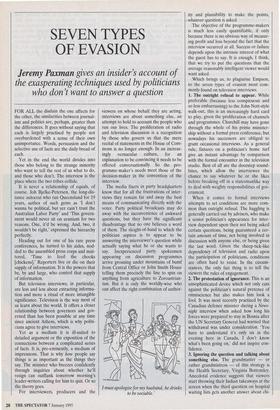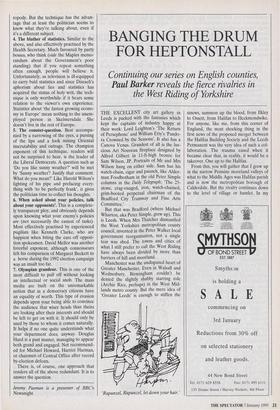SEVEN TYPES OF EVASION
Jeremy Paxman gives an insider's account of
the exasperating techniques used by politicians who don't want to answer a question
FOR ALL the disdain the one affects for the other, the similarities between journal- ism and politics are, perhaps, greater than the differences. It goes without saying that each is largely practised by people not overburdened with a sense of their own unimportance. Words, persuasion and the selective use of facts are the daily bread of each.
Yet in the end the world divides into those who belong to the strange minority who want to tell the rest of us what to do, and those who don't. The interview is the place where the two tribes collide.
It is never a relationship of equals, of course. Joh Bjelke-Petersen, the long-dis- tance autocrat who ran Queensland for 19 years, author of such gems as 'I don't wanna be political, but yer cain't trust the Australian Labor Party' and 'This govern- ment would never sit on uranium for two reasons. One, it'd be wrong. And, two, it wouldn't be right,' expressed the hierarchy perfectly.
Heading out for one of his rare press conferences, he turned to his aides, nod- ded to the assembled press corps and mut- tered, 'Time to feed the chooks [chickens].' Reporters live or die on their supply of information. It is the powers that be, by and large, who control that supply of information.
But television interviews, in particular, are less and less about extracting informa- tion and more a ritual of more intangible significance. Television is the way most of us learn about the world. It offers a closer relationship between governors and gov- erned than has been possible at any time since ancient Athens, which is why politi- cians agree to give interviews.
Yet as a medium it is ill-suited to detailed argument or the exposition of the connections between a complicated series of facts. It is, pre-eminently, a medium of impressions. That is why how people say things is as important as the things they say. The minister who breezes confidently through inquiries about whether he'll resign can outflank tomorrow morning's leader-writers calling for him to quit. Or so the theory goes.
For interviewers, producers and the viewers on whose behalf they are acting, interviews are about something else, an attempt to hold to account the people who run our lives. The proliferation of radio and television discussion is a recognition by those who govern us that the mere recital of statements in the House of Com- mons is no longer enough. In an increas- ingly vernacular culture, for an explanation to be convincing it needs to be offered conversationally. So the pro- gramme-maker's needs meet those of the decision-maker in the convention of the interview.
The media fixers in party headquarters know that for all the frustrations of inter- views they remain far and away the best means of communicating directly with the voter. Party political broadcasts may do away with the inconvenience of awkward questions, but they have the significant disadvantage that no one believes a word of them. The sleight-of-hand to which the politician aspires is to appear to be answering the interviewer's question while actually saying what he or she wants to say. Inexperienced party spokesmen appearing on discussion programmes arrive groaning under mountains of bumf from Central Office or John Smith House telling them precisely the line to spin on anything from agriculture to Zoroastrian- ism. But it is only the worldly-wise who can affect the right combination of author- I must apologise for my husband, he drinks to be sociable.' ity and plausibility to make the points, whatever question is asked.
The objective of the programme-makers is much less easily quantifiable, if only because there is no obvious way of measur- ing profit and loss beyond the fact that the interview occurred at all. Success or failure depends upon the intrinsic interest of what the guest has to say. It is enough, I think, that we try to put the questions that the average reasonably intelligent viewer would want asked.
Which brings us, to plagiarise Empson, to the seven types of evasion most com- monly found on television interviews.
1. The outright refusal to appear. While preferable (because less conspicuous and so less embarrassing) to the John Nott-style walk-out, this is an increasingly hard card to play, given the proliferation of channels and programmes. Churchill may have gone through the whole of his prime minister- ship without a formal press conference, but nowadays his successors are obliged to grant occasional interviews. As a general rule, fixtures on a politician's home turf give an instant advantage by comparison with the formal encounter in the television studio. Best of all are the doorstep sound- bites, which allow the interviewee the chance to say whatever he or she likes before breaking off in a statesmanlike way to deal with weighty responsibilities of gov- ernment.
When it comes to formal interviews attempts to set conditions are more com- mon than outright refusal. The haggling is generally carried out by advisers, who make a senior politician's appearance for inter- view dependent upon their not being asked certain questions, being guaranteed a cer- tain amount of time, not being involved in discussion with anyone else, or being given the last word. Given the sheep-tick-like dependency of television and radio upon the participation of politicians, conditions are often hard to resist. In the circum- stances, the only fair thing is to tell the viewers the rules of engagement.
2. The protestation of ignorance. This is an unsophisticated device which not only cuts against the politician's natural pretence of omniscience but also makes him look a fool. It was most recently practised by the Canadian defence minister during a News- night interview when asked how long his forces were prepared to stay in Bosnia after the UN Secretary General had warned that withdrawal was under consideration. 'You have to understand it's only six in the evening here in Canada, I don't know what's been going on,' did not inspire con- fidence.
3. Ignoring the question and talking about something else. The grandmaster — or rather grandmistress — of this strategy is the Health Secretary, Virginia Bottomley. Anecdotal evidence suggests that viewers start throwing their Indian takeaways at the screen when the third question on hospital waiting lists gets another answer about chi- ropody. But the technique has the advan- tage that at least the politician seems to know what they're talking about, even if it's a different subject.
4. The blather of statistics. Similar to the above, and also effectively practised by the Health Secretary. Much favoured by party bosses, who think (vide the Maples memo- randum about the Government's poor standing) that if you repeat something often enough, people will believe it. Unfortunately, as television is ill-equipped to carry bald statistics and since Disraeli's aphorism about lies and statistics has acquired the status of holy writ, the tech- nique is only worthwhile if it bears some relation to the viewer's own experience. Statistics about 'the fastest growing econo- my in Europe' mean nothing to the unem- ployed person in Skelmersdale. She doesn't live in the rest of Europe.
5. The counter-question. Best accompa- nied by a narrowing of the eyes, a pursing of the lips and a look mixing Oriental inscrutability and outrage. The champion exponent of this technique, readers will not be surprised to hear, is the leader of the Liberal Democrats. A question such as `Do you like sunny weather?' will be met by 'Sunny weather? Justify that comment. What do you mean?' Like Harold Wilson's lighting of his pipe and prefacing every- thing with 'to be perfectly frank', it gives the politician time to collect his thoughts.
6. When asked about your policies, talk about your opponents'. This is a complete- ly transparent ploy, and obviously depends upon knowing what your enemy's policies are (not necessarily the easiest of tasks). Most effectively practised by experienced pugilists like Kenneth Clarke, who are happiest when biting the ears off opposi- tion spokesmen. David Mellor was another forceful exponent, although connoisseurs felt his comparison of Margaret Beckett to a horse during the 1992 election campaign was an insult too far.
7. Olympian grandeur. This is one of the most difficult to pull off without looking an intellectual or social snob. The mass media are built on the unremarkable notion that in a democracy citizens have an equality of worth. This type of evasion depends upon your being able to convince the audience that wiser heads than theirs are looking after their interests and should be left to get on with it. It should only be used by those to whom it comes naturally. It helps if no one quite understands what your department does, anyway. Douglas Hurd is a past master, managing to appear both grand and engaged. Not recommend- ed for Michael Howard, Harriet Harman, or chairmen of Central Office after record by-election defeats.
There is, of course, one approach that renders all of the above redundant. It is to answer the question.
Jeremy Paxman is a presenter of BBC's Newsnight.



















































 Previous page
Previous page